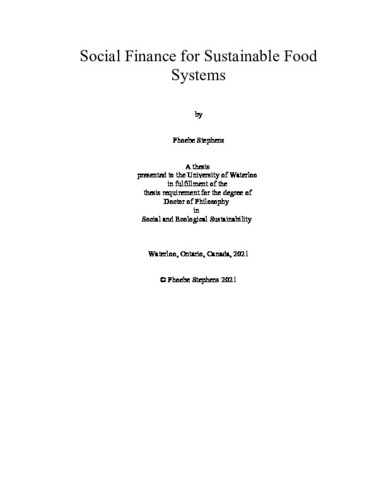| dc.description.abstract | The scholarly literature demonstrates that dominant financial investment patterns tend to contribute to unsustainable outcomes in the food system. Mainstream lending hurts prospects for building more sustainable food systems as it tends to favour large-scale industrial food and farming businesses. Mainstream finance tends to under-resourced alternative food systems by not providing them with the capital they need to grow and thrive. Further, financialization, which can be understood as the growing share of financial rather than productive activities in the economy, shapes the broad contours of the food system and also exacerbates unsustainability. Despite the powerful dynamics exerted by finance on food systems, there is room in the alternative food systems literature for an analysis of the role of finance in supporting transitions towards more sustainable food systems. Social finance is a growing investment approach that aims to reorient finance for greater sustainability outcomes and some believe that it holds promise for addressing the problems with mainstream finance in the food system.
This dissertation contributes a novel perspective to the literature on alternative food systems. It asks: (1) What explains the rise of social finance initiatives that target food systems?; (2) Which characteristics of the initiatives support or inhibit transitions towards more sustainable food systems? (3) What broader lessons arise regarding the design and implementation of these initiatives for scholars and practitioners interested in food system change? To answer these questions, this qualitative study provides analysis that draws on semi-structured interviews with 34 participants in Canada, United States and the Netherlands related to social financing funds that are geared towards food system change, as well as primary documents such as impact investment reports and fund websites and a review of the grey and scholarly literatures.
The analysis is spread across four main empirical chapters, each of which answer the above research questions in different ways, and taken together, contribute to advancing the arguments that arise from this work. First, the rise of social finance initiatives that target food systems emerged through a combination of factors including: i) the unsustainability of the dominant industrial food system; ii) the increased financialization of the food system; iii) the lack of financial capital available to alternative food systems; and iv) growing interest in alternative financing mechanisms after the 2008 financial crisis. Second, these initiatives show varying degrees of transformative potential, depending on their investment ethos and the version of sustainability (weak or strong) to which they subscribe. The primary hurdles that are holding these initiatives back relate to their reliance on individuals to make change, small scale, inability to consistently ensure accountability of their impacts to investors and the misalignment between the time horizons of investments compared to those required to make meaningful social and environmental impact. Finally, the findings point to broader lessons about the role that social finance can play in sustainability transitions. I do not consider social finance, in its current form, a robust or radical enough approach to encourage profound sustainability transitions but it could be a helpful tool as part of a larger innovation ecosystem to support sustainable food systems. | en |

